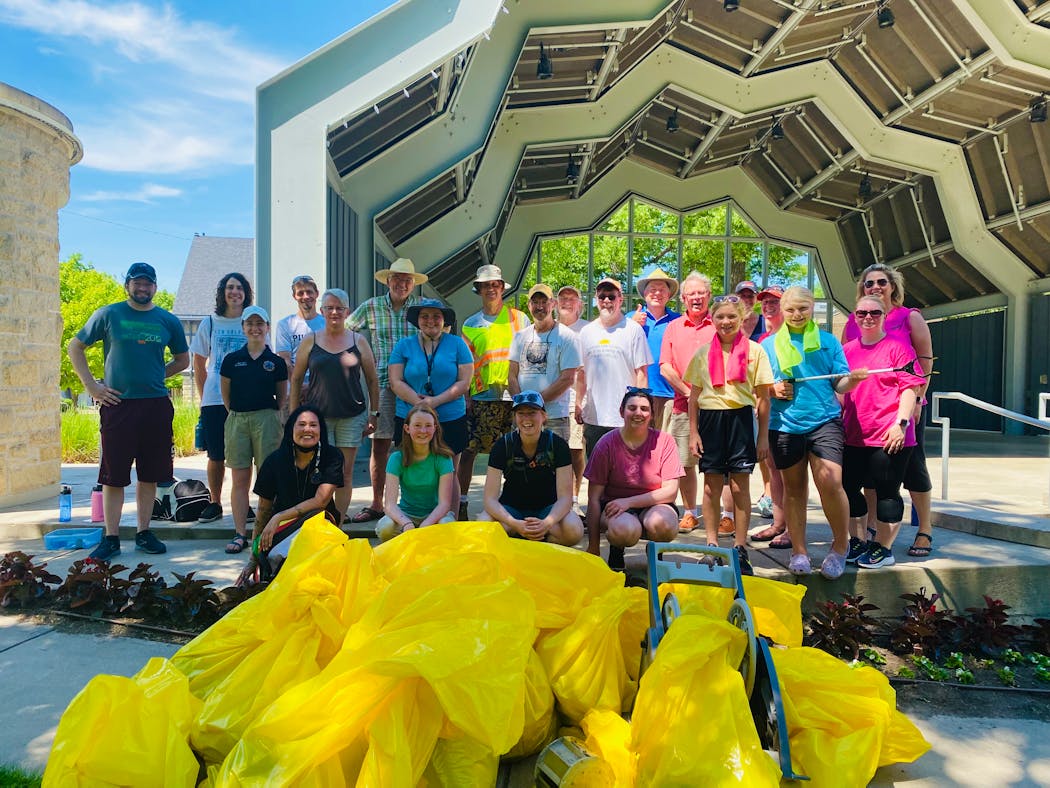Our story begins with one citizen and 92 photos of garbage.
Bottles. Cans. Food wrappers. Discarded tires. Soggy plastic bags. Used diapers.
Once the snow melts, there's nothing to block Minnesota's view of all the junk that piled up over the winter. One Goodhue County resident, good and mad about the drifts of garbage along the Mississippi River, headed to a township meeting a few years ago with photo proof and a plea. Could the responsible jurisdiction please clean up the mess?
But the mess covered a tangle of jurisdictions. There was garbage on township land, on county land, on state land. There was litter strewn across the city of Red Wing's waterfront and onto the property of the nearby nuclear power plant and into the sovereign territory of the Prairie Island Indian Community.
Watching the trash talk that day was Goodhue County Commissioner Linda Flanders.
"There were so many jurisdictions that I realized, we're never going to get anywhere," she said. "Everyone was throwing up their hands. 'I could do this, but it's not going to solve the problem.' 'I could do that, but it's not going to solve the problem.'"
If no community could solve the problem alone, maybe they could work on it together.
The Mississippi River has been called one of America's most endangered rivers; choked by garbage, urban pollution, agricultural runoff, mercury, bacteria, nitrogen, PFAS and microplastics. A problem so huge, it feels like someone else's problem.
Goodhue County, it turns out, is home to problem solvers.
At Prairie Island, the story begins with one woman, one very large dog and a bright ribbon dress.
Nicky Buck, a traditional ecological Dakota knowledge-keeper, had watched with dismay as visitors came down from the Twin Cities to fish in Sturgeon Lake by the river. They took their fish home, but they left their garbage behind — in her home.
"I was getting upset, because I had just pulled a tire out [of the river] near Maiden Rock," she said. Sifting through the mess, she found discarded bills with names and addresses. She was tempted, she told her uncle, to drive north and return that tire to sender. Her uncle had a better idea.
"He said, 'My girl, nobody wants to learn from anybody who's angry,'" she said. "'So you just need to be the example you wish to see.'"
She put on bright clothes and her ribbon skirt and started collecting trash by the roadside, accompanied by her eye-catching Great Dane.
"I started picking up trash in town," she said. "I would do it when school busses went by, because I know children are pretty influential in their families."
On a warm summer day in 2021, 30 volunteers set out to clean up the mess someone else had made. They called the event Wakpa Awayankapi, from the Dakota term for those who watch over and protect the river. They collected 119 pounds of trash in one day.
The next year, Flanders launched the Mighty Mississippi Cleanup Challenge, teaming up with Prairie Island and the city of Red Wing. There were cleanup events, there were signs in multiple languages there was a very persuasive pollution video, narrated by a credible Morgan Freeman impersonator.
The cleanup went so well, Flanders extended the challenge to neighboring counties in 2023. To the county that collected the most trash would go the bragging rights.
Last year, bragging rights went to Dakota County, where 178 volunteers spent 334 hours picking up 2,475.5 pounds of trash at seven different events. But the real winner was the river. And Goodhue County, which just won an award from the National Association of Counties for the initiative.
This year's Mighty Mississippi Cleanup Challenge runs from April 15 to May 15. Organizers are hoping many more counties join in and add their weirdest finds to the annual Wall of Shame. Car mufflers. Bicycles. Furniture. Fluffy pink house insulation. None of these things belong in the river. And none of them are in the river. Not anymore.
Red Wing City Council Member Becky Norton, a science teacher, sees a lesson in the litter. She sees the tragedy of the commons. A public resource — a commons — being destroyed by the people who share it. Fishermen who toss away garbage that poisons the fish. Neighbors who won't pick up the trash at their feet, because it's not their trash.
"That's the thing about the river cleanup," Norton said. "It is a group of people who recognize that we all live here, we all take out of this commons. When can we take a moment to put it back?"
If you're up to the challenge, visit: goodhuecountymn.gov/1485/Mighty-Mississippi-Cleanup

Brooks: An incomplete list of things that went right for Minnesota in 2024

Brooks: How one group trains young Minnesotans to go out on a limb with their careers

Brooks: Cards on the table, this longtime Minneapolis bar could use some support

Brooks: How a Dakota nonprofit is working to reconnect Minneapolis to its lost history




